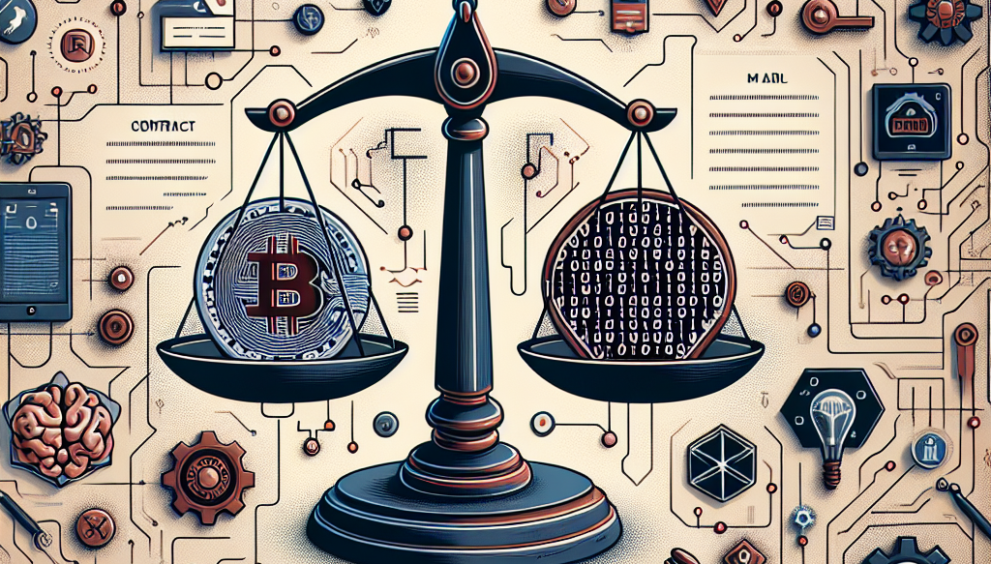Understanding Smart Contracts: What They Mean for the Legal Industry

Introduction
Blockchain technology is bringing big changes to the legal world, with smart contracts being one of the most impactful innovations. These self-executing contracts automate processes by embedding agreement terms directly into code. Smart contracts have the potential to increase efficiency, cut costs, and reduce human error. However, they also present challenges, like legal enforceability, jurisdiction issues, and the need for new regulations. This guide explores how smart contracts work and how they are changing the way contracts are created, executed, and enforced.
Introduction To Smart Contracts: Revolutionizing The Legal Landscape
Smart contracts are transforming the legal industry by automating how agreements are executed and enforced. These self-executing contracts are written in code and run on blockchain technology, offering benefits such as increased efficiency, cost reduction, and fewer human errors.
Key Points:
- What are Smart Contracts?
- Self-executing contracts with terms directly written into code.
- Operate on blockchain, ensuring automatic execution when conditions are met.
- Eliminate the need for intermediaries like lawyers or notaries.
- Blockchain Technology:
- A decentralized, secure, and transparent system for recording transactions.
- Ensures that once a smart contract is executed, it can’t be changed or tampered with.
- Benefits for the Legal Industry:
- Efficiency: Automates contract execution, reducing time and costs.
- Transparency: All parties have access to the same information, reducing misunderstandings.
- Accountability: Immutable records ensure contracts are executed as agreed.
- Challenges:
- Legal Recognition: Many jurisdictions don’t yet have clear laws for smart contracts.
- Technical Expertise: Legal professionals need to collaborate with tech experts to implement these contracts effectively.
How Smart Contracts Enhance Efficiency In Legal Transactions
Smart contracts, powered by blockchain technology, are transforming the legal industry by making transactions faster, more secure, and less expensive. Here’s how they enhance efficiency:
Key Points:
- Automation:
- Smart contracts automatically execute actions when predefined conditions are met.
- Example: In real estate, the contract can transfer property ownership once payment is received, without needing manual intervention.
- Decentralized & Immutable:
- Smart contracts run on blockchain, meaning they cannot be changed once deployed.
- This ensures trust, transparency, and security in legal transactions.
- Reduced Need for Intermediaries:
- No need for lawyers, notaries, or other intermediaries.
- Saves time and reduces costs by cutting out middlemen.
- Accuracy & Clarity:
- Smart contracts are coded precisely, leaving little room for misinterpretation.
- Reduces the risk of costly disputes due to misunderstandings.
- Cost Savings:
- Traditional contracts involve significant fees for drafting, reviewing, and enforcing.
- Smart contracts minimize human intervention, lowering legal costs.
- Challenges:
- Legal professionals need expertise in blockchain and coding.
- Smart contracts are rigid, which could be problematic if changes are needed after deployment.
The Role Of Smart Contracts In Reducing Legal Disputes

Smart contracts, based on blockchain technology, can significantly reduce legal disputes by offering automation, transparency, and precision in legal agreements. Here’s how:
Key Points:
- Transparency:
- Smart contracts run on a blockchain, so all parties can access the same information.
- This reduces disputes since no one can secretly alter the contract terms.
- Immutability:
- Once deployed, smart contracts cannot be changed, ensuring security and trust.
- In contrast, traditional contracts can be altered, leading to disagreements.
- Automation:
- Smart contracts automatically execute terms when certain conditions are met (e.g., transferring property after payment).
- This reduces the risk of human error or delays that often lead to disputes.
- Clarity & Precision:
- The terms of a smart contract are written in code, ensuring that they are clear and unambiguous.
- Traditional contracts can be confusing, leading to misunderstandings and legal disputes.
- Cross-Border Transactions:
- Smart contracts are standardized and not limited by geographic boundaries.
- This helps reduce disputes in international transactions caused by different legal systems.
Read Also: Smart Contracts and Blockchain: What Lawyers Need to Know
Smart Contracts And Their Impact On Contract Law
Smart contracts, powered by blockchain technology, are transforming contract law by automating the creation, execution, and enforcement of agreements. Here’s how they impact the legal industry:
Key Points:
- Automation:
- Smart contracts automatically execute when predefined conditions are met (e.g., transferring property after payment).
- This reduces the need for intermediaries like lawyers or notaries, saving time and costs.
- Immutability & Security:
- Once deployed, smart contracts cannot be changed, ensuring a high level of security and trust.
- Unlike traditional contracts, which can be disputed or altered, smart contracts are tamper-proof.
- Challenges with Flexibility:
- Unlike traditional contracts, smart contracts cannot be easily amended. If there’s an error or unforeseen circumstance, the code must be reworked.
- This lack of flexibility raises concerns about how to deal with changes or disputes.
- Adapting Contract Law:
- Traditional principles of contract law (e.g., offer, acceptance, and human intent) don’t always apply to smart contracts.
- Legal frameworks need to adapt to ensure that smart contracts are enforceable and that parties’ rights are protected.
- Cross-Border Issues:
- Smart contracts operate globally on the blockchain, which raises questions about jurisdiction (which country’s law applies) and how disputes should be resolved internationally.
- There’s a need for global cooperation and legal standardization to handle these complexities.
- Benefits for Legal Processes:
- Smart contracts can increase efficiency, transparency, and security, leading to cost-effective and streamlined legal processes.
- Legal professionals who adapt to this technology will be better positioned to handle the changing landscape.
Legal Challenges And Considerations In Implementing Smart Contracts
Smart contracts, powered by blockchain technology, offer huge potential for the legal industry, but their implementation raises several legal challenges. Here are the key issues:
Key Challenges:
- Enforceability:
- Traditional contracts are governed by established laws to ensure their validity in court.
- Smart contracts are executed automatically by code, raising questions about whether they are legally binding in the same way.
- There is no universal legal framework for smart contracts, which can lead to uncertainty.
- Immutability:
- Once a smart contract is deployed on the blockchain, it cannot be changed.
- This is problematic if errors are found or if the contract needs to be modified due to unforeseen circumstances.
- Unlike traditional contracts, which can be amended, smart contracts lack this flexibility.
- Jurisdiction Issues:
- Smart contracts operate on decentralized networks, making it hard to determine which country’s laws apply.
- This can complicate dispute resolution and create legal complications across borders.
- Data Privacy and Security:
- Smart contracts often require access to sensitive data to function, raising concerns about how that data is protected.
- Legal professionals must ensure compliance with data privacy laws, like GDPR, to avoid legal issues.
- Changing Role of Legal Professionals:
- Smart contracts can automate many tasks, but they cannot replace the judgment and expertise of legal professionals.
- Lawyers will need to adapt by learning coding and blockchain technology to draft and manage smart contracts effectively.
Future Prospects: Smart Contracts And The Evolution Of The Legal Industry
Smart contracts are transforming the legal industry by using blockchain technology to automate agreements, reducing costs and improving efficiency. Here’s a summary of their future impact:
Key Benefits:
- Efficiency and Cost Reduction:
- Smart contracts execute automatically once conditions are met, eliminating the need for intermediaries like lawyers or notaries.
- This speeds up transactions and makes legal services more affordable and accessible.
- Security and Reliability:
- Blockchain’s immutability ensures once a smart contract is deployed, it can’t be altered.
- This reduces the risk of disputes, as the terms are clear and unchangeable.
- Transparency and Trust:
- The terms of smart contracts are transparent and visible to all parties, enhancing trust and reducing the likelihood of misunderstandings.
Challenges and Considerations:
- Adapting Legal Professionals:
- Lawyers will need to understand coding and blockchain technology to draft and manage smart contracts.
- This presents a learning curve but offers an opportunity to modernize legal practice.
- Regulatory Changes:
- Smart contracts operate across borders, which requires the development of standardized legal frameworks.
- New regulations will be needed to address issues like data privacy, security, and enforceability.
Conclusion
Smart contracts, self-executing contracts with the terms of the agreement directly written into code, are revolutionizing the legal industry by offering increased efficiency, transparency, and security. They reduce the need for intermediaries, minimize the risk of human error, and ensure automatic enforcement of contractual terms. However, their integration into the legal framework poses challenges, such as the need for new legal standards, addressing jurisdictional issues, and ensuring the code’s accuracy and fairness. As the legal industry adapts to these technological advancements, professionals must balance the benefits of automation with the complexities of legal interpretation and enforcement, ultimately reshaping the landscape of contract law.

















































































































































































































































































































































































































































































































































